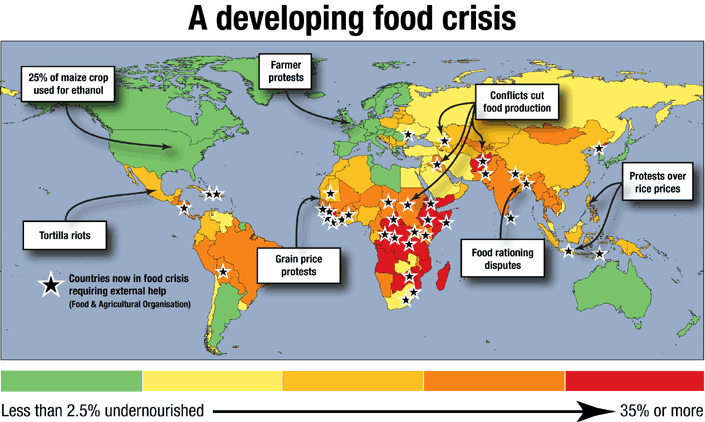In the developing climate crisis, food — fuel to keep us alive — has to take precedence over fuel for our machines. [22 April 2008 | Peter Boyer]
It’s hard to break old habits. Changes that seem trivial – adopting new waking-sleeping routines, or stopping snacks between meals, or travelling by a new route, for instance – can appear life-threatening when we’re faced with putting them into practice.
 Old sayings support the status quo. When you’re on a good thing, stick to it. If it’s not broken, don’t fix it.
Old sayings support the status quo. When you’re on a good thing, stick to it. If it’s not broken, don’t fix it.
Using fossil fuel to save ourselves effort – coal for electricity, oil for travelling and lubricating wheels of industry – is one of those habits that it seems we’ll do pretty well anything to hang on to. It’s as if we can’t imagine life without it.
Yet a mere century ago, that’s what life was like. In Tasmania, the personal fuels of choice were wood for heating and hay for horses, the preferred mode of transport. Coal was for railways, ships and gas lighting, and for most people petroleum wasn’t even on the horizon.
We have to face the fact that fossil fuel is acting on us like a drug, and we’re addicted. If we could step out of the tight little closet that is modern “developed” life, we may well wonder how it’s possible to make so much fuss about petrol prices.
Unfortunately, that’s the way it is. But things are afoot in the world that are bringing into sharp relief the foolishness of treating fossil fuel as if our lives depend on it. Because if there’s one thing we need more than petrol, it’s food.
We keep on getting our sums wrong. We keep on thinking that we can actually replicate the energy from fossil fuels – concentrated bio-matter built up over millions of years – with energy from plants grown in a fraction of a human lifetime. It would be laughable if so many people weren’t taking it seriously.
What isn’t laughable is the fact that at a time when the amount of land available for food is being seriously depleted by drought, encroaching seas, urbanisation and human conflict, so much of our remaining arable land is now being dedicated to growing plants for fuel.
For about a decade now, spooked by the idea that oil supplies are getting low, we in the developed world have encouraged farmers and entrepreneurs to grow plants for conversion to biofuels – as fast as they can possibly manage.
So what’s happened? Oil palms have replaced forests, cleared from deep, peaty tropical soils (and releasing megatonnes of carbon dioxide), and land that once grew food for people has been given over to grain for export to make biofuel.
So hunger is rearing its head. The potential food shortage has been talked about for years, but it’s now with us. Food prices are rising, people are getting hungry, and the same people are getting angry. It’s been said that we’re never more than four meals away from anarchy.
All so that we can feel better about driving our cars and flying in our aircraft.
